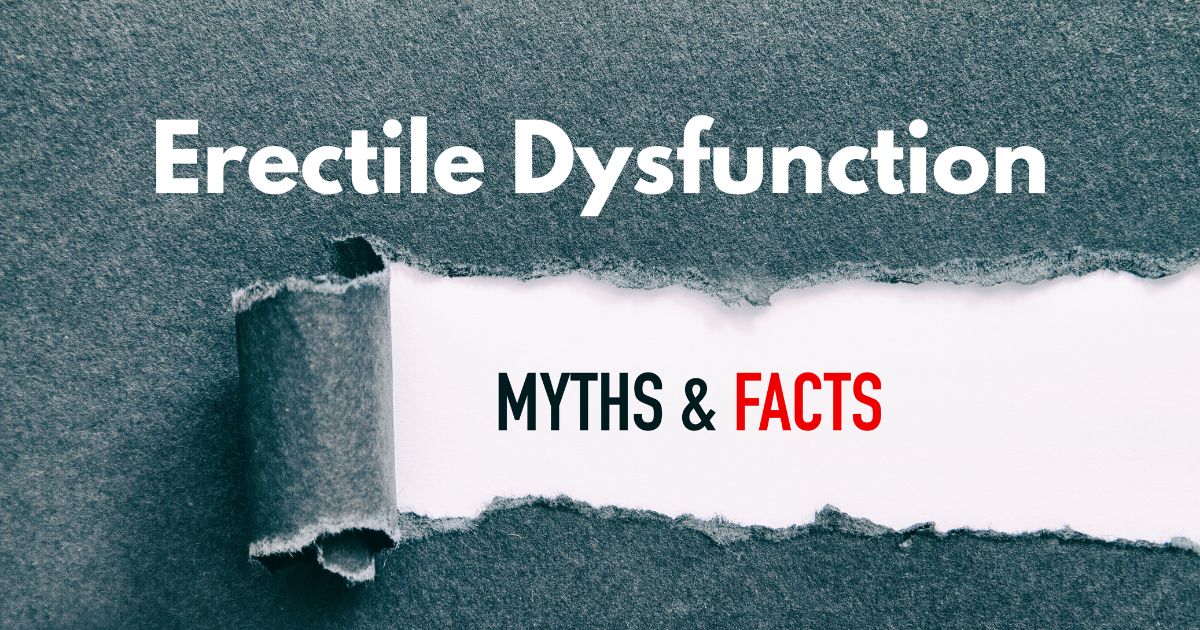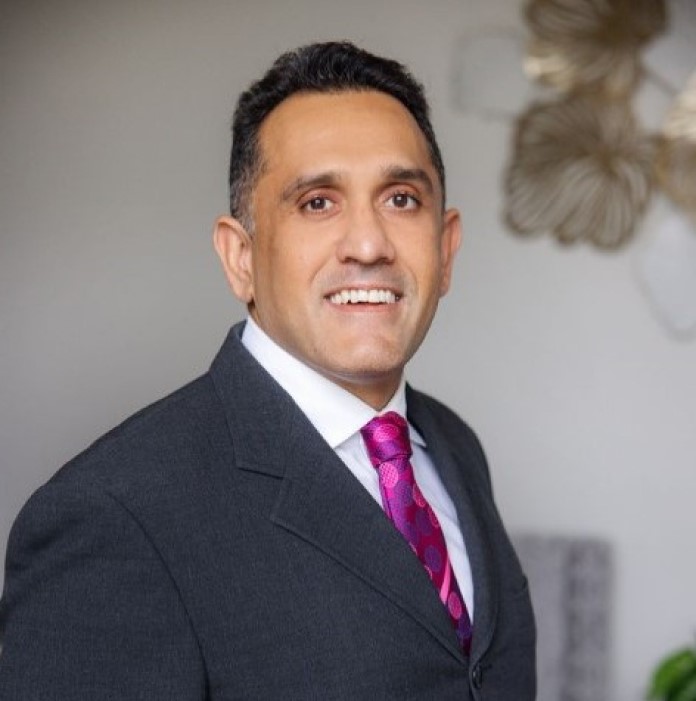
Erectile dysfunction (ED) is a widespread issue of male sexual dysfunction that affects millions, yet it remains a topic rarely discussed openly, especially in group settings.
Many men find speaking about such personal concerns challenging, often leading to feelings of isolation or embarrassment, and may not recognize the potential risk factors associated with this condition.
A study published in The Journal of Sexual Medicine found that, despite statistics showing that the occurrence and severity of ED are most prevalent among older adults, a significant number of those affected have not pursued medical advice or treatment for their condition.
Explore the myths surrounding Erectile Dysfunction (ED), uncover the truths why erectile dysfunction happens and learn about the effective treatments available that can significantly improve quality of life. This guide can empower you to take control of your health by addressing erectile dysfunction head-on.
Myths and Facts About Erectile Dysfunction
Myth 1: ED is Only a Psychological Problem
Truth
It’s easy to think that ED is all in your head, but that’s not the whole picture. Sure, stress and mental health issues can mess with your sexual performance.
However, there are a host of physical reasons that could be at play, too. Conditions like diabetes, high blood pressure and hormone imbalances can impact your ability to get or maintain an erection, according to Wayne State University School of Medicine.
These things affect your body’s plumbing and wiring, so to speak, making it difficult for your body parts to function when you’re trying to be intimate.
Action
If you’re having trouble down there, don’t just chalk it up to a bad day or stress — talk to a doctor.
They can check to see if your sugar levels, blood pressure or hormone levels might be off.
These tests can help determine if you have a physical health issue to address, which could also help your ED.
Remember, it’s not just about getting back your groove; it’s about your overall health, too.
Myth 2: ED is an Inevitable Part of Aging
Truth
A lot of folks think that getting older means saying goodbye to a good sex life, but that’s not necessarily true.
Yes, as you age, you might have a higher chance of experiencing ED, but it’s not a sure thing. Plenty of men continue to enjoy an active and fulfilling sex life as they get older.

Action
The key to keeping things running smoothly, regardless of age, is taking good care of yourself.
Stay active — try walking, swimming or whatever exercise you enjoy. Eat right with lots of fruits, veggies and lean meats and don’t skip regular check-ups.
These steps can help you stay in top form and reduce the risks of aging, including ED. Specific lifestyle changes might also improve sexual function. Think of it as tuning up your car: regular maintenance can keep you running well for a long time.
Myth 3: ED Means Your Sex Life is Over
Truth
It’s a common fear that ED spells the end of your sex life, but that’s far from the truth.
There are many treatments available to get things back on track. The options are plentiful, from pills to pumps and even some lifestyle tweaks.
Sometimes, it’s just about finding the right one that works for you.
Action
The best first step is to talk to your doctor. They can help you determine what’s happening and guide you through the various treatments.
Sometimes, a mix of methods — like medication along with some counseling or dietary changes — works best.
It’s all about teamwork between you and your healthcare provider to find the right strategy to keep your sex life active and enjoyable.
Myth 4: ED Isn’t a Big Deal if You’re Not Sexually Active
Truth
You might think that ED doesn’t matter if you’re not active in the bedroom, but it could be waving a red flag about other health issues.
ED can sometimes signal more significant problems like heart disease or diabetes. These conditions can affect blood flow, not just to the penis but throughout your entire body, which can lead to serious health risks.
Action
Whether or not you’re looking to be sexually active, it’s wise to discuss ED and other sexual problems with your doctor. It could lead to early detection of different health problems that, once managed, not only improve your overall health but might also reverse ED.
So, consider it a sexual health check-up — keeping everything in check, regardless of your sex life, is a good idea for your overall well-being.

Myth 5: Only the Man is Affected by ED
Truth
It’s a common misconception that ED is a personal issue affecting only the man. In reality, erection problems can impact sexual partners in a relationship.
It can strain emotional and sexual intimacy, leading to frustration, decreased self-esteem and other relationship problems.
A Statista survey found that “Among men aged 25-45 years who had erectile dysfunction in the past year (36 percent), over half avoided sexual encounters because of it. This statistic illustrates the percentage of men in the United States who said erectile dysfunction (ED) had these effects on their relationships and dating life as of April 2021.”
Action
Open communication with your partner is key. Discussing your feelings can help you better understand the situation and support each other.
If you find it challenging to discuss or if it is affecting your relationship, it might be helpful to see a counselor or therapist together.
How is Erectile Dysfunction Treated in Kansas City?
When dealing with the causes of erectile dysfunction (ED), it’s essential to know that there are several proactive steps you can take to manage and potentially find the best treatment for your condition. Here are a few:

1. Consult with a Healthcare Provider
The first step in addressing ED is to have a thorough evaluation, including a physical exam and discussions regarding sexual intercourse, by a health professional. Erectile dysfunction doctors in Kansas can help identify any underlying causes, whether physical, psychological, or a combination of both, which may involve ordering blood tests to rule out medical conditions.
This consultation allows for a personalized and tailored treatment approach, ensuring that solutions are tailored to your needs rather than relying on trial and error.
This targeted strategy enhances the effectiveness of treatments and can significantly improve outcomes.
2. Take Prescription Medication
There are several effective prescription drugs available for the treatment of ED that can help manage ED, such as sildenafil (Viagra), tadalafil (Cialis) and other medications approved by the Food and Drug Administration. These medications work by enhancing blood flow to the penis, facilitating the ability to achieve and maintain an erection.
Again, It’s best to consult with a healthcare provider to see if these medications fit your condition since there are many causes of ED.
3. Try Testosterone Replacement Therapy
If tests show that you have low testosterone levels, hormone replacement therapy might be recommended as part of your treatment plan. Low testosterone can lead to reduced libido, fatigue, mood changes, and difficulty maintaining erections. By restoring testosterone to a healthy level, this therapy can improve sexual desire and overall energy. It’s typically administered through injections, gels, or patches, and should always be monitored by a medical professional to ensure safe and effective results over time.
4. Explore Platelet-rich Plasma Therapy (PRP)
PRP therapy uses your blood to help improve erectile function. By taking a sample of your blood, concentrating the platelets and injecting them back into penile tissue, this method promotes healing and blood flow.
This treatment is derived from your body, reducing the risk of allergic reactions. It’s minimally invasive and can potentially offer long-lasting improvements in erectile function.
It is essential to discuss PRP with a healthcare provider to ensure it fits into your overall ED treatment plan. Results can vary depending on individual health conditions.
Practice Lifestyle Modifications
1. Maintain Healthy Diet and Exercise
A study published in The Journal of Sexual Medicine found that maintaining a healthy diet and regular aerobic exercise can improve cardiovascular health, which is crucial for erectile function.
Focusing on heart-healthy foods and physical activities that improve blood flow and overall health is also essential.
2. Quit Smoking and Limit Alcohol
According to MedlinePlus, smoking can impair blood circulation to the penis, while excessive alcohol consumption can affect your liver function and nerve health, both of which can lead to ED.
3. Manage Weight
Being overweight can increase your risk of chronic diseases such as diabetes and cardiovascular disease, which can lead to ED.
A study published in the World Journal of Men’s Health noted that to get the best results from treating erectile dysfunction (ED) in patients who are obese, it’s crucial also to manage obesity.
Managing your weight through diet and exercise can help reduce these risks because obesity and ED often share similar underlying health issues.

KC Wellness Center’s Erectile Dysfunction Treatment Program
At KC Wellness Center, we understand the challenges faced by men with ED and offer a cutting-edge treatment option: Platelet-Rich Plasma (PRP) therapy.
PRP involves using a concentration of a patient’s platelets to promote tissue healing and regeneration. This medical treatment has shown promising results in treating ED by enhancing blood flow and nerve sensitivity in the penile area.

How PRP Works
- Blood Collection: A small sample of your blood is taken.
- Platelet Concentration: The blood is processed in a centrifuge to concentrate the platelets.
- Injection: The PRP is then injected into specific areas of the penis, promoting regeneration and improved function.
Skilled medical professionals perform PRP therapy at KC Wellness Center. It is safe, minimally invasive and relatively painless. Many patients experience improved erectile function, confidence and overall quality of life.
Bust the Myths, Treat ED at a Kansas City Men’s Clinic
Understanding the truths about ED can demystify the condition and encourage men to seek the help they need.
If you’re struggling with ED, remember you’re not alone, and effective treatments are available. By addressing these myths and taking action, you can manage your symptoms and lead a fulfilling life.
Explore the options discussed here and don’t let misconceptions stand in the way of getting the erectile dysfunction help you need.
If you or someone you know is struggling and doesn’t know where to go for erectile dysfunction treatment, schedule a consultation at KC Wellness Center. You can also reach us through our erectile dysfunction hotline (816) 214-5276.
Frequently Asked Questions
Is erectile dysfunction only caused by psychological issues?
No. While stress and mental health can contribute to ED, physical health issues like diabetes, high blood pressure, and hormonal imbalances are also major causes. A full medical evaluation can help uncover the root cause.
Is treatment for ED always medication-based?
No. While medications like Viagra or Cialis are popular options, treatments can also include PRP therapy, testosterone replacement, lifestyle changes, and counseling. The most effective treatment depends on the individual.
Does erectile dysfunction only affect the man?
No. ED can impact both partners emotionally and physically. Open communication and, if needed, couples counseling can help maintain intimacy and reduce relationship stress.

Dr. Rahul Kapur, M.D. is a board-certified family medicine physician with a dedicated passion for integrative medicine and a deep knowledge of functional medicine. He was named intern of the year at Wesley Medical Center in Wichita, KS, and has been practicing as a hospitalist for over a decade. He has successfully helped many patients in Kansas City with his specialized IV bags, ketamine therapy, hormone optimization and weight loss therapy methods.

